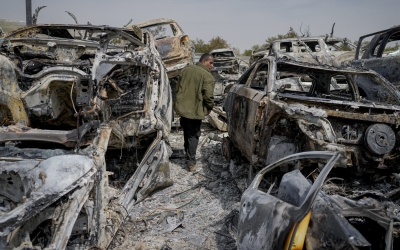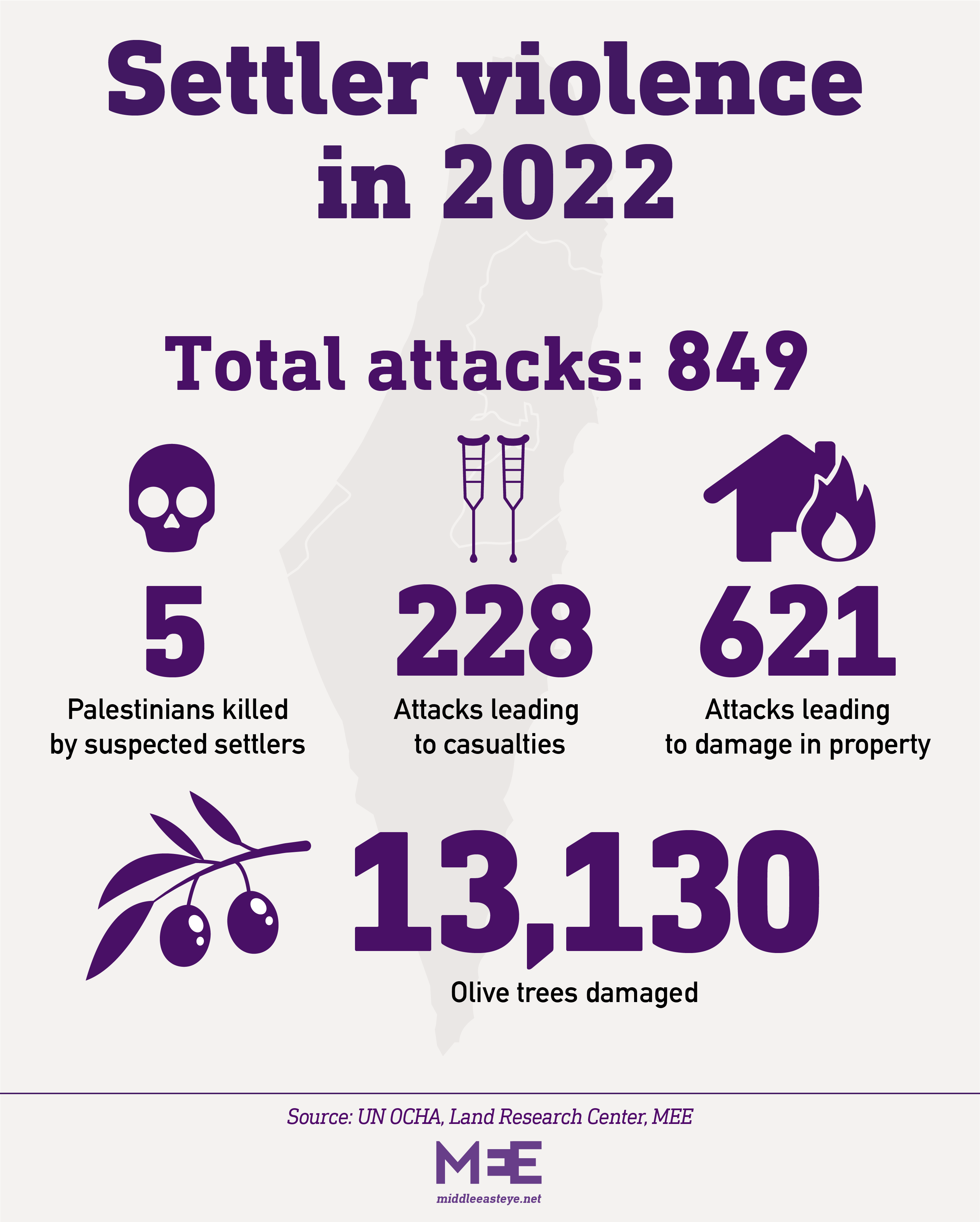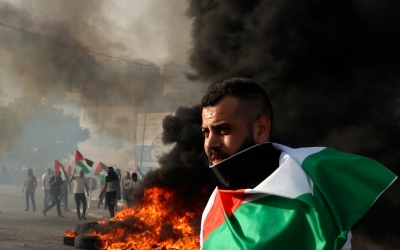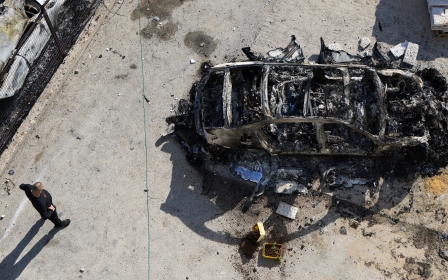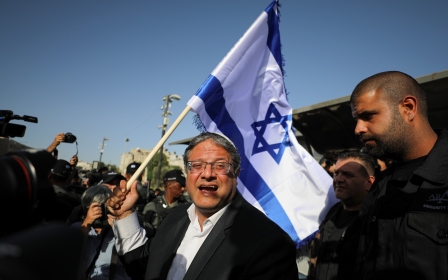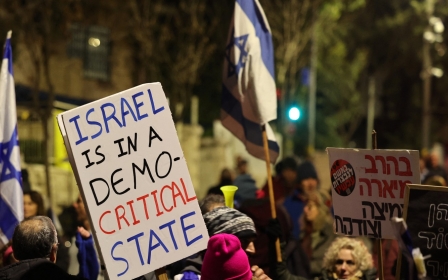Israel: Settler terrorism is now the law

On Sunday, a Palestinian gunman killed two Israeli settlers outside the village of Huwwara.
The killing was in retaliation for Israel's massive attack on Nablus a few days earlier, in which 11 Palestinians were murdered and the main shopping street was partially destroyed.
They swept through the town, burning everything in sight - cars, houses, utility poles - all the while bellowing cries of vengeance
After the Huwwara killings, hundreds of soldiers and Shin Bet agents swarmed through the village in search of the gunman. But when night fell, there was not a soldier in sight. That's when Jewish settlers massed in their hundreds and swept through the town, burning everything in sight - cars, houses, utility poles - all the while bellowing cries of vengeance. They even brazenly posted celebratory messages to social media platforms.
One Palestinian was shot and killed and more than 400 Palestinians were wounded, including a baby who was seriously injured.
On Monday, the army has taken over the entire town. All shops have been closed. Of the eight settlers arrested during the height of the riots, all have been released.
Settler terrorism
Although many Israelis took to social media to express their shock, with some likening it to a pogrom or Kristallnacht, another called it the triumph of the "Zionist Reich" and a third wrote on Facebook: "Welcome to 1933."
However, settler terrorism is nothing new to the Palestinians, with settler violence against Palestinians in the West Bank on a year-to-year upward trend since 2016, according to the UN.
There were at least 849 attacks by settlers against Palestinians in 2022, with at least 228 of them leading to casualties, UN data shows. In comparison, 496 attacks were recorded in 2021 and 358 in 2020.
Out of last year’s total attacks, 594 led to damage to properties. According to the Jerusalem-based Land Research Centre, 13,130 Palestinian-owned olive trees were damaged.
UN experts accuse Israeli authorities of being complicit in settler violence.
"Disturbing evidence of Israeli forces frequently facilitating, supporting and participating in settler attacks, makes it difficult to discern between Israeli settler and state violence," a UN statement issued last year said.
Huwwara, home to 7,000 Palestinians and encircled by Jewish settlements, has been the scene of repeated attacks in recent months.
While these latest events seem, on the surface, extraordinary and unprecedented, they are a direct reflection of the new Israeli government.
Not only is it the most extremist in the country’s history but, for the first time, it includes convicted terrorists as senior ministers. They endorse and embrace this violence. They scorn the instruments of the state - the army and police - which have exerted a limited amount of control over such extremist violence under previous governments.
Such collusion between state forces and settlers engaged in wanton acts of terrorism against the Palestinians threatens to turn Israel into a lawless state. Now, for the first time, homicidal violence, kept in check in the past, has been unleashed - with the government tacitly endorsing it.
Vigilante militia
We are no longer talking about a Third Intifada, although Palestinians will certainly retaliate. During previous Palestinian uprisings, the Israeli government’s response, while employing excessive use of force, when compared to what is going on today, probably showed some measure of restraint.
Now, the gloves are off and the state and these vigilante militias have unleashed a terrifying level of violence.
Without direct and decisive outside intervention by the US, the European Union and the United Nations, there may be much more bloodshed, including the ransacking of dozens, if not more, of Palestinian villages.
The final goal of these Israeli terrorists is the complete eradication of a Palestinian presence in Israel-Palestine, followed by the destruction of the Al-Aqsa Mosque complex and the building of a Third Temple.
How far will the world let this progress?
‘This pogrom is massive’
Two reporters, one of them Haaretz's Josh Breiner, documented the pogrom. He tweeted that for the first time in his career as a journalist, Israelis had fired live ammunition directly at him.
I confirmed with another Israeli reporter that this gunman was wearing an Israeli army uniform. It's astonishing that an apparently active-duty soldier would attempt to kill an Israeli reporter. I contacted the Israeli army chief press officer for comment but did not receive a response by the time of writing.
The army and the settlers have joined sides - something every Israeli activist already knew. But this highlights it in an especially disturbing way.
Of course, the Palestinians face this danger every day. But it must be difficult for a privileged Israeli to imagine that the Judeo thugs could hate him so much that they'd be just as happy if he were dead than alive.
In a Twitter thread, Breiner offered an eyewitness account: “You've certainly asked yourselves how many arrests there were on this night when Jews carried out a pogrom in a Palestinian village, burning houses and cars, pelting journalists with stones during the major riots, all under the nose of the IDF.
"And so, as expected, the answer is: no arrests [Breiner later updated that six have been arrested]. You can be sure that there is one minister [Ben Gvir] who didn't cry at the sight of the flames in Hawara. He promised to be the owner of the house, no? [Ben Gvir says that Arabs will have to get used to the fact that Jews are the 'landlord' in Israel].”
Palestinian journalist Muhammad Shehada's reporting on Twitter offered a detailed account of the extent of the devastation: “Hundreds of settlers are attacking Huwara, escorted & guarded by Israeli soldiers. Palestinian residents are caged in. Mosques’ loudspeakers are pleading for help. Anyone trying to defend themselves is attacked by settlers & soldiers. This pogrom is massive! Fires everywhere!”
'Hawara must be erased'
Israeli journalist Edo Konrad tweeted that Bezalel Smotrich, a senior government minister, who was once arrested by the Shin Bet while transporting an explosive device intended for a protest against the Gaza withdrawal, liked a tweet calling for the "erasure" (i.e. genocide) of Huwwara:
This is a translation of the genocide tweet which Konrad retweets: "The village of Hawara must be erased today. Enough with statements about building and strengthening settlements. The deterrence we've lost must be regained immediately, with no place for mercy."
Settlers aren't listening to Netanyahu. He is irrelevant. They already took the law into their own hands. In fact, there is no law
Fania Oz-Salzberger, daughter of the late Israeli novelist Amos Oz, likened the settler attack to a Cossack pogrom. She invoked the name of the leader of the thuggery, Bogdan Chmielnicki, the 17th-century Ukrainian military commander responsible for the murders of tens of thousands of Jews.
Translation: "Jewish thugs burning down homes in Hawara in the finest tradition of Chmielnicki. One person critically wounded, families rescued from burning buildings, scores suffering from tear gas inhalation. An army reserve unit quickly mobilised and sent 'to bring calm'. What? To embrace the pogromniks and stroke their heads?"
Jews have suffered their share of pogroms: the Romans burned rabbis at the stake; the Spanish Inquisition tortured them on the rack; Hitler gassed millions of European Jews in the extermination camps.
Given the massive violence in Huwwara, it is ghoulish for Israeli Prime Minister Benjamin Netanyahu to release a statement asking settlers "not to take the law into their own hands".
That horse has already left the barn. Settlers aren't listening to him. He is irrelevant. They already took the law, and much else, into their own hands.
In fact, there is no law. The settlers rule and no one stands in their way.
The views expressed in this article belong to the author and do not necessarily reflect the editorial policy of Middle East Eye.
Middle East Eye propose une couverture et une analyse indépendantes et incomparables du Moyen-Orient, de l’Afrique du Nord et d’autres régions du monde. Pour en savoir plus sur la reprise de ce contenu et les frais qui s’appliquent, veuillez remplir ce formulaire [en anglais]. Pour en savoir plus sur MEE, cliquez ici [en anglais].



